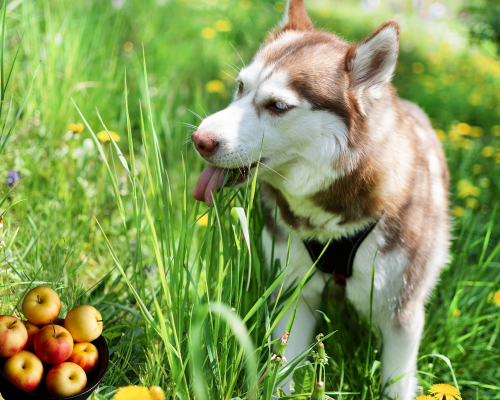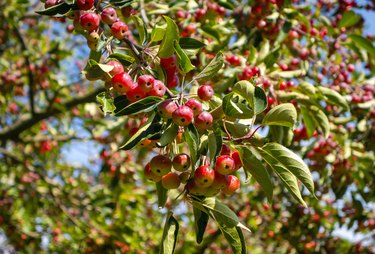If you are a dog owner and love to spend time outdoors with your furry friend, you may have come across crab apple trees during your walks. Crab apples are small, tart fruits that grow on certain varieties of apple trees. While you might find their vibrant colors and unique appearance appealing, as a responsible pet owner, it is essential to understand whether these fruits are safe for your dog to consume.

Credit: petfluence.co
What are Crab Apples?
Crab apples belong to the same family as regular apples, but they are much smaller in size and have a more sour taste. They are often used in cooking for making jellies, jams, pies, and even alcoholic beverages. Crab apple trees are also commonly found in gardens and public spaces.
Potential Risks for Dogs
While crab apples are generally safe for human consumption, it is important to note that they can pose certain risks to dogs. Here are some factors to consider:
Toxicity:
Crab apples are not considered highly toxic to dogs. However, the seeds, core, and stems of crab apples contain small amounts of cyanide-producing compounds, known as cyanogenic glycosides. Ingesting a large quantity of these parts could lead to gastrointestinal upset, such as vomiting and diarrhea, in dogs. The risk is higher if your dog consumes a significant number of crab apples or regularly grazes on them.
Choking Hazard:
Due to their small size, crab apples can pose a choking hazard for dogs, especially smaller breeds or those prone to swallowing things whole. The hard seeds and tough skin of the fruit can become lodged in the throat or gastrointestinal tract, requiring immediate veterinary attention.

Credit: www.cuteness.com
Precautions for Dog Owners
To ensure the safety and well-being of your dog, here are some precautions you can take:
Supervise Your Dog:
When walking in areas where crab apple trees are present, keep a close eye on your dog and discourage them from consuming fallen fruit or chewing on the trees. Supervision is essential, especially if your dog tends to explore and ingest unfamiliar objects.
Remove Fallen Crab Apples:
If you have a crab apple tree in your own yard, regularly check and remove any fallen fruits to prevent your dog from accessing them. Consider fencing off the area around the tree if your dog is particularly curious or prone to ingesting non-food items.
Teach The “leave It” Command:
Training your dog to respond to the “leave it” command can be invaluable in situations where they come into contact with potentially harmful substances. Teaching them to avoid eating unknown objects can help prevent accidents and keep them safe.
Consult With A Veterinarian:
If you suspect that your dog has ingested crab apples or is exhibiting symptoms of poisoning, contact your veterinarian immediately. They can provide you with appropriate advice and guidance tailored to your dog’s specific needs.
Frequently Asked Questions For Are Crab Apples Poisonous For Dogs
Are Crab Apples Toxic To Dogs?
Crab apples are not toxic to dogs in small amounts, but large quantities can cause gastrointestinal upset.
Can Dogs Eat Crab Apples?
Yes, dogs can eat crab apples in moderation, but it’s best to remove the seeds and core before feeding them.
What Are The Risks Of Dogs Eating Crab Apples?
The main risk is choking on the seeds or core. Additionally, overeating crab apples can cause diarrhea or upset stomach.
How Many Crab Apples Can A Dog Eat?
It’s recommended to limit the consumption of crab apples to a few slices at most. Monitor your dog for any adverse reactions.
Conclusion
In conclusion, while crab apples are not highly toxic to dogs, they can still pose risks depending on the quantity consumed and the size of the dog. It’s best to err on the side of caution and prevent your dog from consuming these fruits. By supervising your dog, removing fallen crab apples, and training them to avoid unknown objects, you can help ensure their safety and prevent any potential health issues.
Remember, if you have any concerns or suspect your dog has ingested crab apples, be sure to consult with a veterinarian for professional advice and guidance.

Leave a Reply